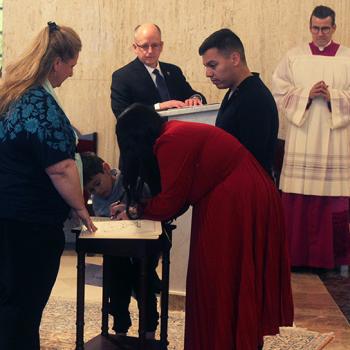 This weekend it seemed that a sucker is born every minute only because so many Catholics practice artificial birth control. Otherwise, they'd pop out in batches.
This weekend it seemed that a sucker is born every minute only because so many Catholics practice artificial birth control. Otherwise, they'd pop out in batches.
Here's proof: Fr. John Corapi's superiors in the Society of Our Lady of the Most Holy Trinity had to go to the press to save their own good name, and the name of the Church, from Corapi's recent . . . well, let's call it strategic communication.
On Friday, June 17th, the former EWTN personality released a voiced-over video announcing his departure from "active ministry as a priest," and blaming the bishop of Corpus Christi, Texas for investigating allegations that Corapi had sexual relations with a former employee "against the will and better judgment" of his SOLT superiors.
After hinting darkly at conspiracy—"There are certain persons in authority in the Church that want me gone"—Corpi fired a scattered broadside at the Church's protocols for handling priests accused of sexual wrongdoing. Among Corapi's complaints: a requirement to waive "all of my civil and human rights in order to hold harmless anyone who chooses to say defamatory and actionable things against me with no downside to them."
It now seems that Corapi was shading the truth, to say the least, in his own favor. On June 19th, SOLT regional priest-servant Fr. Gerard Sheehan told National Catholic Register's Joan Frawley Desmond that the "civil and human rights" Corapi was expected to waive amounted to the right to sue. Specifically, they involved his right to sue former employees—including his accuser and several witnesses—for violating a non-disclosure agreement by offering evidence to investigators.
Sheehan explained: "In canon law, there can't be any pressure on witnesses; they have to be completely free to speak." He added that he had tried to conduct investigations without speaking to the principal witnesses, and stopped only after Corapi sent him a letter announcing his intention to leave active ministry and religious life.
Corapi, by the way, has taken to calling himself "The Black Sheepdog."
Taken together, the two stories look like one of those how-many-differences-can-you-spot placemat puzzles for kids—and not terribly bright kids, either. "I am being asked to give up all my civil and human rights" sounds a lot more draconian than "They wanted to make me restore some of the rights I made my employees give up." "Certain persons . . . want me gone" makes a much snappier entry in a martyrology than "they tried to accommodate me and my lawyers, but we decided to cut bait, anyway."
I'm inclined to credit the regional priest-servant. Why? His account is precise and detailed, and he shows no interest in inculpating Corapi. Corapi's is vague, with an operatic sweep and the apparent goal of inculpating the entire Church except for himself. If Corapi's SOLT superior had mentioned he'd galloped naked through the mother house, swinging a cutlass, then we might be forced to compare apples to apples.
What disheartens me isn't so much that Corapi spun the facts so drastically but the fact that so many people bought it. Yes, I know—it's easy to say that now that Fr. Sheehan has spoken up for SOLT (and after a number of people have spoken up for Corpus Christ's Bishop Mulvey). But even before that, Corapi's churlishness ought to have made his fans question his motives, at least for a moment.
Probably Corapi's personal magnetism has something to do with the tenacity of his following, but in truth, it doesn't take a very gifted person to play on somebody's sense of injury. Catholics are feeling wounded—by the sex abuse crisis, and by the criticisms of the priesthood that have followed. They're prostrate with bad-priest fatigue. Some want a good priest, a victim-priest, to say or do something to the make last decade feel like a bad dream.
That might sound a little too pat, but I remember when Corapi first announced his suspension, how many commenters on various Catholic blogs brought up the Dallas Charter. The Dallas Charter established norms for handling priests accused of abusing young people; the accusations against Corapi involved consensual sex with a grown woman. Nothing about the Dallas Charter covered his case, yet many observers were happy to throw it all in the same basket.





